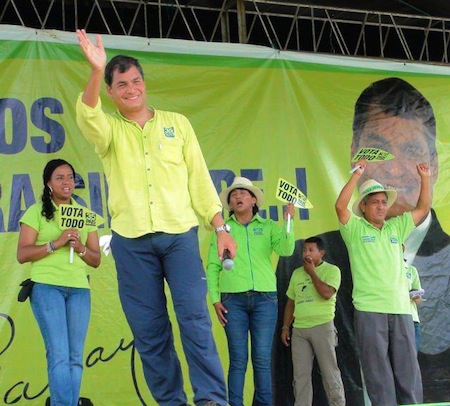On Sunday, Ecuadorian voters will go to the polls to elect a new president and, like in the Armenian presidential election that will be held one day later, there’s very little suspense about who will win.![]()
Incumbent president Rafael Correa (pictured above) seems set to win his third consecutive term outright on the February 17 vote, avoiding the need for a runoff, which would occur nearly two months later on April 7, and thereby extending his rule through 2017.
One recent poll from Opinión Pública Ecuador shows that Correa leads his nearest opponent with 56% to 13%, and other polls have shown Correa with over 60% support.
Furthermore, in the simultaneous elections for 137 members of Ecuador’s unicameral parliament, the Asamblea Nacional (National Assembly), Correa’s party, the democratic socialist Movimiento Patria Altiva i Soberana or Alianza PAIS (Proud and Sovereign Fatherland, with ‘PAIS’ an acronym that’s also Spanish for ‘nation’) formed in 2006 to boost Correa’s initial presidential run, is set to extend its legislative lead. It currently holds 59 of the 124 seats in the current Asamblea Nacional, with the less-dominant populist Partido Sociedad Patriótica 21 de Enero (PSP, January 21 Patriotic Society Party), headed by former president Lucio Gutiérrez as its nearest competition, holding just 19 seats.
So what does that say about the current moment in Ecuador and, more generally, Correa’s contribution to Latin American politics?
Here are five takeaways from Sunday’s likely result. Continue reading Five things that Correa’s likely reelection tells us about Ecuador (and South America)
